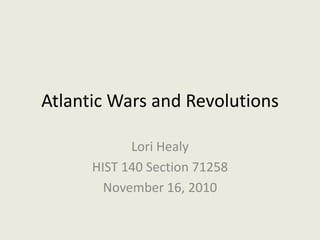
Hist 140 atlantic wars and revolutions 1. healy
- 1. Atlantic Wars and Revolutions Lori Healy HIST 140 Section 71258 November 16, 2010
- 2. Chapter 13- Revolutions Dominion In 1685 King Charles II died and left his throne to his younger brother James II. James II openly practiced Catholicism and decisively declared his royal dictatorship. James II consolidated the eight northern colonies into a super-colony knows as the Dominion of New England. It extended from the Delaware River to Canada. The Dominion dispensed with assemblies. It entrusted administration to a governor-general, assisted by a lieutenant governor and an appointed council. The Dominion regime shocked New England. James II
- 3. Chapter 14- The Atlantic Poverty During the 1750s and 1760s colonists reported growing numbers of the poor in the urban seaports. The growing number of the urban poor alarmed contemporaries. The poverty was a huge contrast with the increasingly noticeable wealth of the lawyers, merchants, and government officials in seaports. The wealthiest tenth of Bostonians owned more than 60 percent of the urban wealth, while the bottom three-tenths owned nearly nothing. The growth of urban poverty reflected the greater transatlantic additions of the British empire.
- 4. Chapter 14- The Atlantic Africans Most eighteenth-century emigrants did not come to America on their own, they were mostly enslaved Africans forced across the Atlantic to work on plantations. During this time the British colonies imported 1.5 million slaves, which is more than three times the number of free immigrants. Almost all of the imported slaves remained slaves for life. About one percent of the blacks living in the British colonies became free prior to the American Revolution.
- 5. Chapter 15- Awakenings Growth and Limits Every colonial region developed a widespread and noticeable array of churches. In 1750 the mainland colonies sustained about 1,500 local congregations. Church services provided social gatherings and information from the world. Churches also provided an environment for reading government proclamations, posting new laws, and holding elections to the assembly.
- 6. Chapter 17- The Great Plains Horses and Guns Horses were first evolved in North America but had become extinct about ten thousand years ago. During the sixteenth century the horse returned to North America as a domesticated animal kept by the Hispanic colonists. Not until late in the seventeenth century did Indians obtain horses from New Mexicans through trade and nighttime raids. Horses helped the Indians haul their loads over long distances. The horse improved life substantially for the village inhabitants and enormously for the travelers. During the eighteenth century as they acquired horses, the Great Plains also obtained firearms. They wanted guns to defend their villages and continued to use the bow and arrow for hunting.
- 7. Chapter 18- Imperial Wars and Crisis Balance of Power Indians determined the military balance of power within North America. Indians dominated the forest passages between the rival empires. The natives shared a broad interest in exploiting and perpetuating their strategic position between the French and the British colonies. The Indians sought favorable prices and abundant presents from both sides. They benefited from the competition between the traders and officials of rival empires. By the mid-eighteenth century it became obvious that the British were growing more numerous and powerful than the French. In 1754 the British colonists outnumbered the French 1.5 million to seventy thousand in North America.
- 8. Chapter 18- Imperial Wars and Crisis Empire of Liberty Few colonists sought national independence until the American Revolutionary War began in 1775. Colonists felt pride in their empire, derived economic benefits from trading, and feared the death and destruction of a civil war. The British began to tighten the empire in the 1760s. The British raised taxes. This resulted in a long and bloody war that was not wanted by anyone. The war obliged the mainland colonial leaders to declare independence, changing thirteen colonies into states with elected governments bounded into a confederation. When the Civil War broke out in 1775, the colonies to the north remained loyal to the British. The West Indian sugar planters, to the south, also remained loyal to the British. The Atlantic seaboard colonists felt a new confidence in their own power as they noted their growing populations. They rejected British rule. The British succeeded in the imperial wars, but during the next two years they lost their most important colonies to rebellion. The new United States were victorious in the War of the American Revolution (1775-83), and embraced the continental expansion. Thomas Jefferson described the United States as an “empire of liberty.”
- 9. Chapter 19- The Pacific Islands To Europeans, the Pacific Ocean remained the most mysterious part of the temperate earth. The Pacific was distant and hard to reach from Europe. The Pacific covers one third of the earth which made it hard for mariners to accurately find a secure track to cross it. During the sixteenth century Magellan, a Spanish mariner, discovered the western route into the Pacific. The Spanish wanted to keep the ocean’s secrets from the Europeans. During the 1760s the British and French became interested in the Pacific Ocean. By the 1760s political and technological developments rendered the Pacific more accessible to the British and French ships.